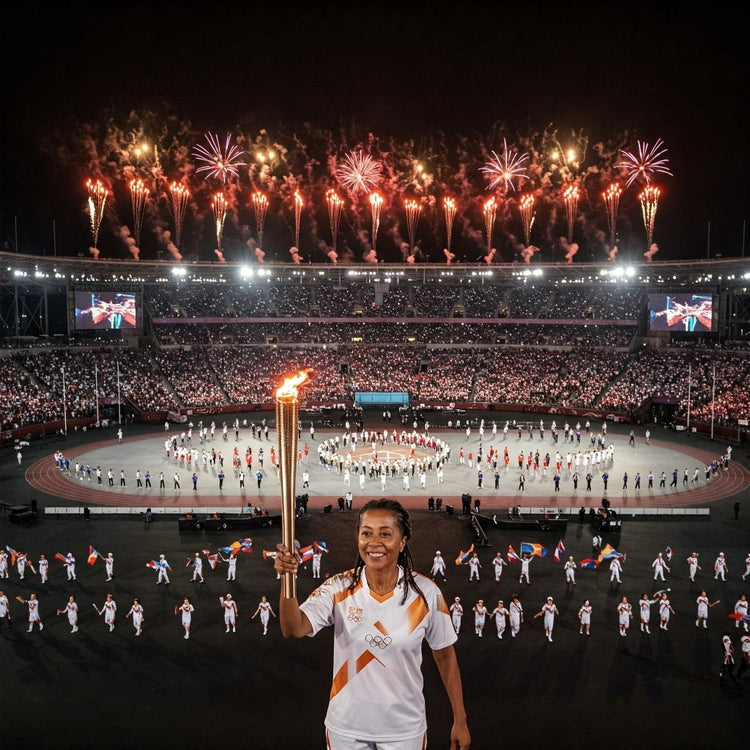De Olympische Spelen behoren tot de meest prestigieuze sportevenementen ter wereld. Dit wereldwijde sportfestijn trekt om de vier jaar miljoenen toeschouwers en atleten. Gedurende de geschiedenis hebben de Spelen zich ontwikkeld tot het ultieme podium voor topsporters.
Vanuit het oude Griekenland groeide dit evenement uit tot een internationaal spektakel. Niet alleen sportieve prestaties staan centraal, maar ook politiek, economie en maatschappelijke ontwikkelingen spelen een belangrijke rol. In deze gids ontdek je hoe de Olympische Spelen door de eeuwen heen zijn veranderd. Daarnaast bespreken we de impact op de wereld en de meest gedenkwaardige momenten.

🏛️ De Olympische Spelen: Meer dan alleen sport
De Olympische Spelen gaan verder dan alleen topsport. Dit evenement symboliseert eenheid, competitie en doorzettingsvermogen. Atleten uit verschillende landen strijden niet alleen om goud, maar inspireren ook miljoenen mensen wereldwijd.
🔥 Waarom zijn de Olympische Spelen zo belangrijk?
➡️ Sport verbindt landen en culturen, ondanks politieke verschillen.
➡️ Topatleten krijgen de kans om hun talent te tonen op het hoogste niveau.
➡️ Elke editie brengt iconische prestaties die generaties inspireren.
🌍 Welke sporten maken deel uit van de Olympische Spelen?
✅ Traditionele disciplines zoals atletiek, zwemmen en gymnastiek.
✅ Teamsporten zoals voetbal, basketbal en volleybal.
✅ Nieuwe en populaire sporten zoals skateboarden en surfen.
⚔️ De oorsprong van de Olympische Spelen in het oude Griekenland
In 776 v.Chr. vonden de eerste Olympische Spelen plaats in Olympia, een heilige stad in Griekenland. Atleten uit verschillende stadstaten reisden af naar Olympia om hun krachten te meten in diverse sporten.
🏺 Waarom werden de Spelen georganiseerd?
➡️ De Grieken eerden Zeus, de oppergod, met sportwedstrijden.
➡️ Het evenement bood stadstaten de kans om vreedzaam samen te komen.
➡️ Sporters zagen deelname als een mogelijkheid om eeuwige roem te behalen.
🏆 Welke sporten werden beoefend?
✅ Hardlopen op de stadionpiste van Olympia.
✅ Pankration, een ruige mix van worstelen en boksen.
✅ Wagenrennen, een van de spectaculairste onderdelen.
📜 De evolutie van de Olympische Spelen in het oude Griekenland
Door de eeuwen heen groeiden de Olympische Spelen uit tot een grootschalig evenement. Nieuwe sporten kwamen erbij, regels werden strikter en steeds meer atleten namen deel.
💡 Hoe veranderden de Spelen?
➡️ Meer disciplines werden toegevoegd, zoals speerwerpen en discuswerpen.
➡️ Deelnemers kregen intensievere trainingen en meer aanzien.
➡️ Koningen en rijke burgers begonnen atleten financieel te steunen.
🏺 Hoe lang bleven de Spelen populair?
✅ Meer dan 1000 jaar vonden de Spelen om de vier jaar plaats.
✅ In 393 na Christus verbood de Romeinse keizer Theodosius I alle heidense festivals, waaronder de Olympische Spelen.
⚡ De val en wedergeboorte van de Olympische Spelen
Na de val van het Romeinse Rijk verdwenen de Olympische Spelen volledig. Pas in de 19e eeuw brachten historici en sportliefhebbers de traditie terug.
🌍 Hoe werden de Spelen opnieuw gelanceerd?
➡️ De Franse baron Pierre de Coubertin speelde een cruciale rol in de heropleving.
➡️ In 1896 vonden de eerste moderne Olympische Spelen plaats in Athene.
➡️ Atleten uit 14 landen namen deel aan internationale competities.
🏆 Wat veranderde ten opzichte van de oude Spelen?
✅ Vrouwen mochten later ook deelnemen.
✅ Nieuwe sporten en striktere regels kwamen erbij.
✅ Het evenement groeide uit tot een wereldwijd sportfestijn.
🌍 De modernisering en globalisering van de Olympische Spelen
Tijdens de 20e eeuw groeiden de Olympische Spelen uit tot een wereldwijd fenomeen. Meer landen sloten zich aan en de omvang van het evenement nam explosief toe.
🔥 Hoe groeiden de Spelen uit tot een wereldspektakel?
➡️ Nieuwe disciplines, zoals basketbal en wielrennen, werden toegevoegd.
➡️ Televisie-uitzendingen brachten de Spelen naar miljoenen huiskamers.
➡️ Commerciële belangen en sponsordeals groeiden enorm.
📌 Welke innovaties veranderden de Spelen?
✅ De introductie van de Winterspelen in 1924.
✅ Paralympische Spelen boden een podium aan atleten met een beperking.
✅ Professionele sporters kregen later ook toegang tot de Olympische Spelen.
💰 De economische impact van de Olympische Spelen
Het organiseren van de Olympische Spelen heeft een enorme economische impact. Zowel kosten als opbrengsten spelen een belangrijke rol bij de keuze van gaststeden.
📈 Wat zijn de economische effecten?
➡️ Toerisme en infrastructuur krijgen een flinke boost.
➡️ Organisatiekosten kunnen torenhoog oplopen.
➡️ Niet alle steden profiteren financieel van het evenement.
✅ Welke steden haalden het meeste voordeel?
✔️ Barcelona 1992 transformeerde de stad tot een toeristische topbestemming.
✔️ Los Angeles 1984 maakte enorme winst door slimme marketingstrategieën.
🎯 Conclusie
De Olympische Spelen gaan verder dan alleen sport. Ze brengen landen samen, inspireren miljoenen mensen en laten zien wat doorzettingsvermogen kan bereiken.
🔥 Waarom blijven de Olympische Spelen zo speciaal?
➡️ Elke editie brengt nieuwe sportlegendes voort.
➡️ De impact op economie, politiek en cultuur is gigantisch.
➡️ Talloze atleten inspireren generaties met hun prestaties.
🏆 Ben jij klaar voor de volgende Olympische Spelen? Volg de ontwikkelingen en geniet van sport op het hoogste niveau!

